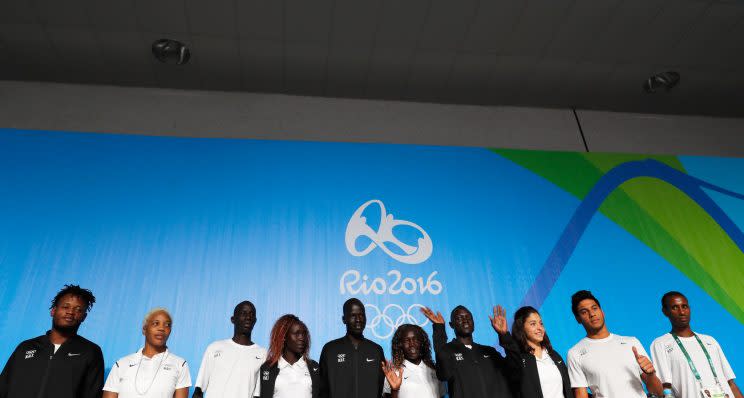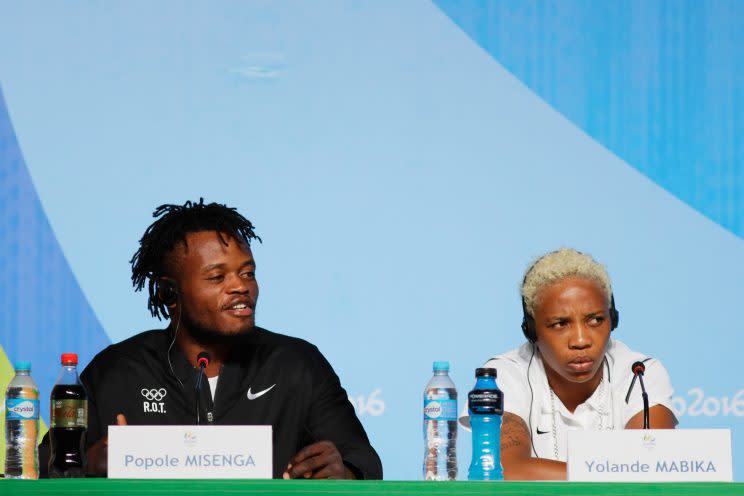Why Refugee Olympic Team is heart and soul of Rio Games

RIO DE JANEIRO – Seeing the word “ROT” underneath the Olympic rings conjures every criticism, cynicism and castigation of the International Olympic Committee’s avarice and irresponsibility, which have flooded the undercurrent of the Games for decades.
But we’re not about to talk about that kind of “rot.”
On these black warm-up suits, being worn by 10 athletes at the Rio Games, “ROT” is actually an acronym. And while the toxicity of its organizers may have tarnished the Olympics in the eyes of the world, it’s these athletes that exist to redeem them, albeit for a moment.
That touchy-feely prattle about the world coming together? About the Olympic Spirit ™, about the triumphs that make us stare with awe at our televisions every four years at human accomplishment?
[Related: Rio Olympics will feature first-ever refugee team]
The athletes in those “R.O.T.” jumpsuits embody all of it.
“R.O.T.”
Refugee Olympic Team.

“We don’t have the same language. We’re all from different countries. But the Olympic flag united us together, and now we are representing 60 million [people] around the world,” said swimmer and Syrian refugee Yusra Mardini. “We want to show everyone that we can do anything. Good athletes. Good people.”
You’ve no doubt heard Mardini’s story by now. She’s an 18-year-old Syrian refugee who fled to Germany on an absolutely harrowing journey, swimming alongside a dinghy for three-and-a-half hours in order to keep it on course and ensure it didn’t sink under the weight of the 20 refugees it carried.
“I swam for my life when the boat sank. Without swimming, I don’t think I survive. I don’t think I rise to this level at the Olympic Games,” she said.
Mardini has quickly become the fresh face of the Refugee Team, not only because of her fluency in English but because of her normalcy: One moment she’s a teenager marveling at the chance to meet Rafael Nadal in the Olympic Village, and the next she’s making impassioned statements about her teammates’ plight.
“I want [Olympic fans] to think that refugees are normal humans that had to leave their homelands. Not because they wanted to, not because they wanted to be refugees or run away or have drama in their lives. They had to leave. To get a new life. Get a better life,” she said.
[Related: 10 can’t-miss Olympic events in NBC’s official TV schedule]
But hers is only one story of many. Her sacrifice, one of many.
There’s also:
* Yonas Kinde, the distance runner who feared for his life in Ethiopia and eventually fled to Luxembourg, where he drives a cab when he’s not, you know, in the Rio Olympics.
* James Chiengjiek, who fled South Sudan at age 13 to avoid being forced into service as a child solider, and will run the 400 meters.
* Popole Misenga, whose mother was murdered when he was a child in Democratic Republic of Congo, who will compete in Judo.
* Yolande Mabika, also of the Congo, who sought asylum with Misenga when the two participated in the 2013 World Judo Championship in Brazil. Her coaches took their money and passports. She escaped their hotel and wandered for two days before finding a community of Congolese immigrants, telling them that her coaches would starve her and lock her in a cage when she didn’t perform well. She went back and rescued Misenga from the same hotel, and they were granted refugee status in 2014.
Mabika and Misenga sat next to each other as the Refugee Team held a press conference in Rio this week. Her hair was a bright blonde, prompting one journalist to ask if that was symbolic.
“I changed my hair style, because to build a new life – to have a new story, a new house, a new place – I have to change everything,” she said. “Including the color of my hair.”

Mabika is one of only 10 athletes on the Refugee Team, the first one in the history of the Olympics. After the London Games, the IOC asked national Olympic committees to identify refugee athletes that had a legitimate chance to compete among the world’s best in Rio.
In total, 43 athletes fit the bill, and then the IOC began paying their bills: Using the Olympic Solidarity fund to assist with fees associated with their training and qualification efforts.
Those 43 athletes were whittled down to 10 athletes, with decisions based on sporting level, personal background and whether the United Nations officially recognized them as refugees. In total, the team has six runners, two swimmers and two judokas. Their costs were covered by the IOC, including travel and housing. They will march in the Opening Ceremonies on Friday under the Olympic flag.
U.S. swimming legend Michael Phelps will also be at that ceremony, for the first time in his Olympic career. He was asked what the Refugee Team means to him.
“It goes back really to how amazing and how powerful the Olympics really are,” he said. “We all know what’s going on in the world. To be able to come together for two weeks and enjoy ourselves, represent our country, be at the coolest sporting event you could possibly go to.”
[Related: Michael Phelps owes selfie to this ‘devastated’ Olympic refugee athlete]
Getting a welcoming message from an American athlete is a nice change for a refugee, rather than hearing someone calling them “terrorists” or “no good” or telling citizens to “lock your doors” if refugees come to town.
(And by “someone” we of course mean “this one guy.”)
But changing the conversation is the mission for these athletes: To bring the struggles of their people to light, and to bring their humanity to the forefront.
Here they’re just athletes, albeit wearing unfamiliar garb under a generic flag. Here they’re members of the community, rather than being chased from one or feared when then enter another.
“A lot of people are writing us, telling us their stories. A lot of people have hopes in us. They’re motivating us to do better,” said Mardini. “The spirit of the team is really amazing. It can lift you up.”
Like a lot of people, I’m stuck between in a constant state of outrage over the IOC’s crooked stewardship of the Games and the soft-focus emotional uplift of the Games themselves. The human toll of the Rio Games is well-documented and hard to reconcile with the relative frivolity of sports.
But this Refugee Team hit me hard. Right in that spot where sports hits you sometimes, as an idealistic place where the world’s problems are eased and anachronistic notions of integrity and camaraderie thrive. Right in that spot where you realize your eyes are welling up hearing a story about an athlete risking her life for the chance to compete, rather than tearing up over the results of her competition.
They’re not going to collect a medal at these games, but that’s OK. Their triumph is that the team exists, and that these athletes exist.
Corny as it sounds in these cynical times, they’re the embodiment of the Olympic dream.
“A lot people there forgot their dreams [in Syria],” said Mardini. “And here we are now, entering this stadium and encouraging people to do their dreams.”
—
Greg Wyshynski is a writer for Yahoo Sports. Contact him at puckdaddyblog@yahoo.com or find him on Twitter. His book, TAKE YOUR EYE OFF THE PUCK, is available on Amazon and wherever books are sold.
Yahoo Sports’ Greg Wyshynski reports live from the streets of Rio:
Grandstanding: A Yahoo Sports podcast
Subscribe via iTunes or via RSS feed



